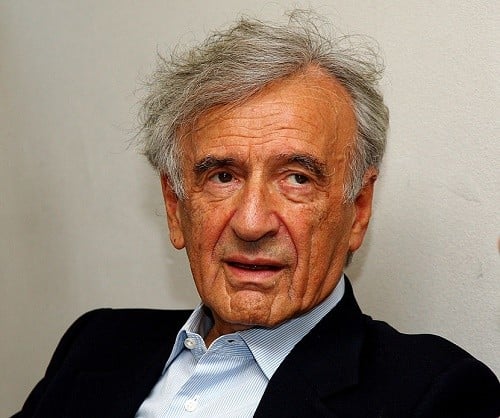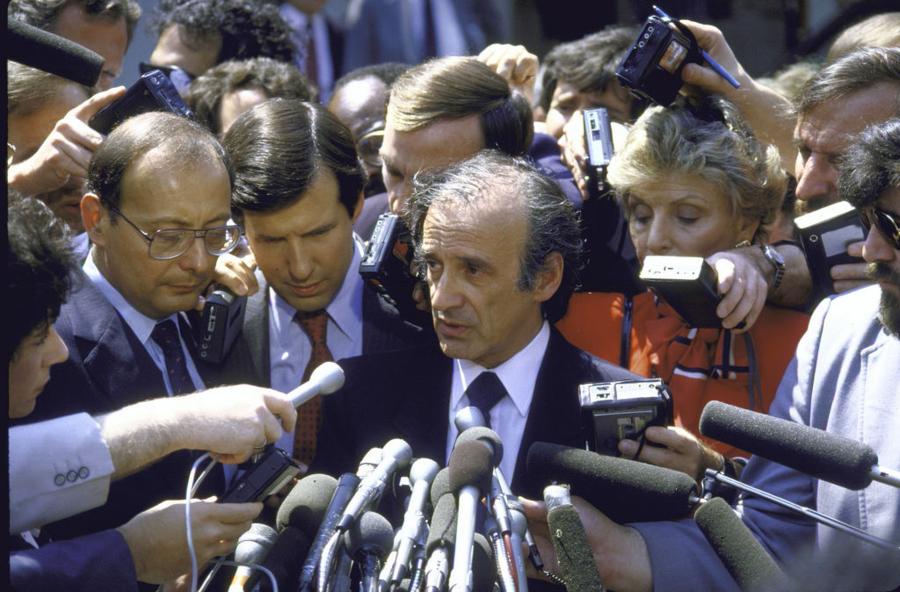What Was Elie Wiesel's Net Worth?
Elie Wiesel was a Romanian-born American professor, author, and activist who had a net worth of $5 million at the time of his death in 2016. It should be noted that Elie and his wife Marion lost at least $12 million, the vast majority of their liquid life savings, in Bernie Madoff's ponzi scheme. Even worse, the Elie Wiesel Foundation lost an additional $15 million.
Elie Wiesel was a Holocaust survivor who wrote 57 books and won a Nobel Peace Prize in 1986 for his work to end racism and violence. In 1944, those who were Jewish and living in Sighet were taken to Auschwitz-Birkenau by the German army, including Wiesel and his entire family. Elie and his father were separated from his mother and three sisters and sent to Auschwitz III-Monowitz to work. Wiesel's father was killed several weeks before the U.S. Third Army freed the prisoners on April 11, 1945. Following the war's end, Wiesel began working as a journalist, putting his Hebrew skills to good use as a translator. It took almost a decade for Wiesel to begin writing about his experiences with the Holocaust, though he eventually penned "And the World Remained Silent" in Yiddish. It totaled about 900 pages and was later shortened to "La Nuit" in French and "Night" in English. The book has since become a "New York Times" bestseller with more than 10 million copies sold.
In the mid-1950s, Elie became a U.S. citizen and went on to write scores of books. He was the recipient of the Presidential Medal of Freedom, the Congressional Gold Medal, and the Legion of Honour, and he was appointed a Commander of the Order of the British Empire. Wiesel was a political activist who championed causes supporting Israel, South African apartheid victims, and ending the violence in Darfur. In 2006, he returned to Auschwitz as part of a segment with "The Oprah Winfrey Show." Elie taught at several universities, including Boston University, the City University of New York, and Yale. He founded the Elie Wiesel Foundation for Humanity with his wife, Marion. Wiesel passed away on July 2, 2016, at the age of 87.
Early Life
Elie Wiesel was born Eliezer Wiesel on September 30, 1928, in Sighet, Kingdom of Romania. He was the son of Shlomo Wiesel and Sarah Feig, and he grew up with three sisters, Hilda, Beatrice, and Tzipora. Elie's parents spoke Yiddish, Hungarian, German, and Romanian. Wiesel's genealogy traces back to Rabbi Schlomo Yitzhaki (Rashi), and Rabbi Yeshayahu ben Abraham Horovitz ha-Levi was one of his descendants. When Elie was 15 years old, his family was placed in a confinement ghetto in Máramarossziget (Sighet) after Germany occupied Hungary. In May 1944, Hungarian authorities began deporting Jewish members of the community to the concentration camp in Auschwitz, and sadly, Sarah and Tzipora were murdered immediately after arriving there. Elie and Shlomo were chosen to perform labor, and they were later deported to the Buchenwald concentration camp. Shlomo died before Buchenwald was liberated in April 1945. In his book "Night," Wiesel wrote about feeling shame while hearing the sounds of Shlomo being beaten and knowing he couldn't help him. Before being liberated from Buchenwald at the age of 16, Elie's left arm was tattooed with the inmate number A-7713. After the war ended, Wiesel joined a transport to Ecouis, France, of 1,000 youths who had survived Buchenwald, then he and 90 to 100 other boys from Orthodox Jewish homes went to a home in Ambloy with "kosher facilities and a higher level of religious observance." The home later relocated to Taverny, where it operated until 1947.
Career
Elie later went to Paris, and he learned French and attended the Sorbonne, where he studied psychology, philosophy, and literature. He started working as a journalist by the age of 19, and he also taught Hebrew and took a job as a choirmaster. In 1949, the French newspaper "L'arche" sent him to Israel as a correspondent, and the Israeli newspaper "Yedioth Ahronoth" later hired him as its Paris correspondent and roaming international correspondent. French author François Mauriac, a Nobel Laureate in Literature, encouraged him to start writing about his experiences during the Holocaust, and Wiesel subsequently wrote the 900-page book "Un di velt hot geshvign (And the World Remained Silent)" in Yiddish. The book was translated into English (and shortened) with the title "Night" in 1960, and it went on to be translated into 30 languages. In 2006, "Night" was featured as part of Oprah Winfrey's book club. Elie moved to New York in 1955 to be a foreign correspondent for the "Yediot Ahronot" newspaper. After moving to the U.S., he wrote more than 40 books, including "The Trial of God" (1979), "All Rivers Run to the Sea" (1994), and "And the Sea is Never Full" (1999).

Getty Images
Personal Life
Elie married Marion Erster Rose on April 2, 1969, and they remained together until his death in July 2016. The couple welcomed son Shlomo Elisha Wiesel in 1972. Marion, a holocaust survivor from Austria, translated several of Elie's books. In 2007, Wiesel was attacked by a Holocaust denier in a San Francisco hotel but wasn't injured. His attacker, Eric Hunt, was later arrested and charged with several felonies.
Elie Wiesel Foundation for Humanity
In 1986, Elie and Marion established the Elie Wiesel Foundation for Humanity. From 1978 to 1986, Elie was the chairman of the President's Commission on the Holocaust, and he spearheaded the construction of Washington, D.C.'s United States Holocaust Memorial Museum. The museum's Elie Wiesel Award is presented to "internationally prominent individuals whose actions have advanced the Museum's vision of a world where people confront hatred, prevent genocide, and promote human dignity." Unfortunately, the Elie Wiesel Foundation for Humanity invested its endowment in Bernie Madoff's Ponzi scheme, which cost them $15 million. Elie and Marion also lost a large amount of their personal savings to Madoff.

(Photo by Diana Walker/Getty Images)
Death
On July 2, 2016, Wiesel passed away at his Manhattan home at the age of 87. A private funeral service was held at the Fifth Avenue Synagogue, then he was laid to rest at Valhalla's Sharon Gardens Cemetery on July 3rd. Senator Orrin Hatch of Utah paid tribute to Elie the following week during a speech on the Senate floor, stating, "With Elie's passing, we have lost a beacon of humanity and hope. We have lost a hero of human rights and a luminary of Holocaust literature." President Barack Obama tweeted, "Elie Wiesel was a great moral voice of our time and a conscience for our world. He was also a dear friend. We will miss him deeply."
Awards and Honors
In the '60s, Wiesel won a Prix de l'Université de la Langue Française (Prix Rivarol) and a National Jewish Book Award for "The Town Beyond the Wall," and he received a Prix Médicis for "A Beggar in Jerusalem." In 1973, "Souls on Fire: Portraits and Legends of Hasidic Masters" won a National Jewish Book Award, and in 1975, he received a Jewish Heritage Award from Haifa University and a Holocaust Memorial Award from the New York Society of Clinical Psychologists. Elie won a Prix Livre Inter, France, for "The Testament" in 1980, a City of Paris Grand Prize in Literature for "The Fifth Son" in 1983, and a Four Freedoms Award for the Freedom of Worship in 1985. He received the S.Y. Agnon Medal (1980), the State of Israel's Jabotinsky Medal (1980), the U.S. Congressional Gold Medal (1984), the Medal of Liberty (1986), the Presidential Medal of Freedom (1992), Elmhurst College's Niebuhr Medal (1995), the National Humanities Medal (2009), and the John Jay Medal for Justice (2014).
Wiesel was appointed a Commander in the French Legion of Honor in 1984 and a Grand Officer in the French Legion of Honor in 1990, and he received an Honorary Knighthood from the U.K. in 2006. He won a Nobel Peace Prize in 1986, the American Academy of Achievement's Golden Plate Award in 1996, the Tel Aviv Museum of Art's Man of the Year award in 2005, and the Norman Mailer Prize for Lifetime Achievement in 2011. Elie received a Grand Cross in the French Legion of Honor in 2000 and an Order of the Star of Romania in 2002. He was honored with the International Campaign for Tibet's Light of Truth award in 2005, the Florida Holocaust Museum's Loebenberg Humanitarian Award in 2012, and the Jefferson Awards' S. Roger Horchow Award for Greatest Public Service by a Private Citizen in 2013. Wiesel received dozens of honorary degrees from colleges and universities such as Lehigh University, DePaul University, Dartmouth College, Tel Aviv University, College of Charleston, University of Warsaw, and Pontifical University of John Paul II.
/2014/08/Elie-Wiesel-1.jpg)
/2010/12/Maya-Angelou.jpg)
/2013/03/David-Azrieli-1.jpg)
/2009/09/GettyImages-85333747.jpg)
/2015/11/GettyImages-455942264.jpg)
/2019/10/jimmy-carter-1.jpg)
/2012/07/Laila-Ali.jpg)
/2010/09/Gloria-Estefan.jpg)
/2020/12/dm.jpg)
/2022/02/Dan-Bongino.jpg)
/2014/04/noel-edmonds.png)
/2019/09/jg.jpg)
/2025/01/amanda.jpg)
/2014/11/GettyImages-826786950.jpg)
/2010/04/Emmitt-Smith-1.jpg)
/2020/06/john-goodman.jpg)
/2018/12/Gianluca-Vacchi.jpg)
/2014/08/Elie-Wiesel-1.jpg)
/2019/10/jimmy-carter-1.jpg)
/2015/04/astrid.jpg)
/2010/08/GettyImages-487195485.jpg)
/2022/02/seuss.jpg)
/2020/06/oh.jpg)
/2015/11/GettyImages-455942264.jpg)
/2015/01/louis.jpg)